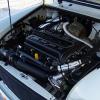The PSI reading is only useful to compare cylinders with each other, ie balancing or problem determination.
You can work out the actual compression ratio from the psi reading, but you also need temperature, altitude and also barometric pressure and some long winded maths...
but from your readings you're going to be taking the head off at least so it'll then be a good time to measure volumes etc...
You can only work backwards if you know what the cylinder volume is when the valves are closed as well as the pressure at this exact point. Any other way will have errors in the calculation and not worth the bother
i dont want to know the compression ratio. all i want to know is what psi or bar to expect from a good 1275 on compression test and on a worn one so i can compare to mine. i know you shouldnt have no more than about 2 bar difference between cylinders but nobody seems to know what is an acceptable pressure on a good engine.
Prssures will vary depending on the engine. For instance, a fairly standard production engine may have pressures of 140psi, where as a high performance engine could give pressures of 240psi. I would be happy with 175psi and confident that its a good cylinder seal. That 110psi is p!ss poor. I recon its a bent inlet valve




















